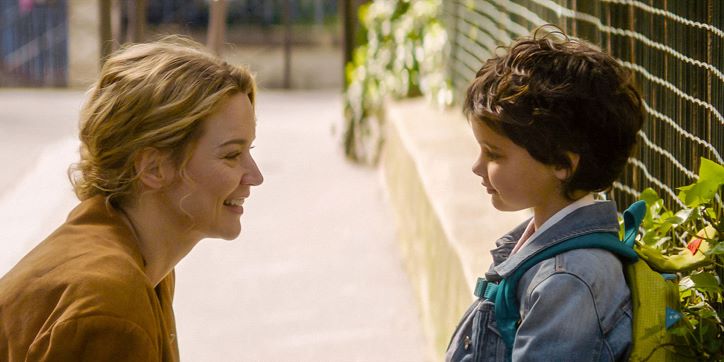![]() This year’s Toronto International Film Festival got off to a promising start: My first screening was the refreshing and quite moving Other People’s Children, starring a current international “it” actor, Virginie Efira. She has had quite a year already, having appeared in Alice Winocour’s Paris Memories. Both films center on her and succeed because of her range, especially here: She’s funny, wry, and completely vulnerable.
This year’s Toronto International Film Festival got off to a promising start: My first screening was the refreshing and quite moving Other People’s Children, starring a current international “it” actor, Virginie Efira. She has had quite a year already, having appeared in Alice Winocour’s Paris Memories. Both films center on her and succeed because of her range, especially here: She’s funny, wry, and completely vulnerable.
The movie also stands out for its perspective, that of a single woman at an age when it becomes much harder to make lifelong friends or to enter into entangled relationships that yield deep histories, as well as for focusing on a surrogate parent. Director Rebecca Zlotowski’s script features one of the most moving and singular breakup scenes, one that rarely occurs onscreen, between a stepparent and a young child.
Fortysomething Rachel (Efira) teachers high school French. As the film opens her class is watching Roger Vadim’s 1959 adaptation of Les liaisons dangereuses. Always on the go after school, she rushes home to pick up her guitar and sprints to her music lesson, where, afterwards, a bumbling classmate about her age, Ali (Roschdy Zem), asks her out for a drink; he spends considerable time deciding if he wants Coke or Diet Coke. The impromptu date becomes the first step in their relationship.
Ali has long been separated from his wife, and they have one child, the well-behaved Leïla (Callie Ferreira-Goncalves), who, when she meets her dad’s new paramour, informs the newcomer that she is four and a half (her emphasis). During one of her overnight visits to Ali’s apartment, Rachel realizes how serious Ali has become about her: A photo of his wife no longer has a place on the bookshelf.
Rachel becomes part of a new family unit, picking up the girl from her judo class and going on holiday as a trio. While out by the sea and away from Paris, Ali, a crazed soccer fan, becomes glued to his phone waiting for the latest score and obliviously loses sight of Leïla. Rachel, immediately, becomes aware and, without losing her cool, finds Leïla playing with other kids—the film gently implies that Rachel’s connection with the girl is emotionally deeper than that with her beau.
Because of her newfound bond, Rachel realizes she wants to have a child, and sees her gynecologist (played by filmmaker Frederick Wiseman) to confirm what she already knows: Time may not be on her side. She has a window of only a few months to become pregnant. However, if the odds are not in her favor, Rachel has Leïla and Ali, though some of his ties to his wife, Alice (Chiara Mastroianni), have never loosened. (Fun fact: The movie premiered in competition for the Golden Lion at the Venice Film Festival, alongside Wiseman’s A Couple and Zem’s Our Ties.)
Though heartfelt (have a Kleenex handy), the film doesn’t dwell on sentimentality. The script simply touches upon many facets of Rachel’s life: She advocates for a troubled student that other teachers feel has limited potential, while maintaining strong ties to her father and younger sister—the film nearly bookends with her celebrating the Jewish New Year. The film often reflects Rachel’s gaze, including a camera’s slow pan of Ali’s body as he showers.
The sweet and tart tone is sober and clear-eyed, and the film becomes stronger for not resorting to easy resolutions. Instead, life and relationships for Rachel remain messy yet hopeful. The outcomes may be harsh, but they are filmed with a translucent light, and in Efira’s case, from without and within.







Leave A Comment